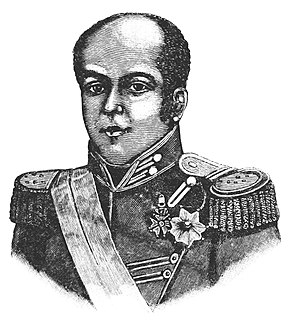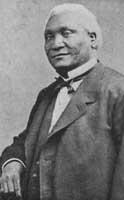Related Research Articles

Faustin-Élie Soulouque was a Haitian politician and military commander who served as President of Haiti from 1847 to 1849 and Emperor of Haiti from 1849 to 1859.

Sylvain Salnave was a Haitian general who served as the President of Haïti from 1867 to 1869. He was elected president after he led the overthrow of President Fabre Geffrard. During his term there were constant civil wars between the various factions. Eventually, he was overthrown in a coup by his eventual successor Nissage Saget, and Salnave was tried for treason and executed.

Brigadier-General Rufus Putnam was an American military officer who fought during the French and Indian War and the American Revolutionary War. As an organizer of the Ohio Company of Associates, he was instrumental in the initial colonization of the Northwest Territory in present-day Ohio following the war. He was known as "Father of the Northwest Territory".

Jacques Roumain was a Haitian writer, politician, and advocate of Marxism. He is considered one of the most prominent figures in Haitian literature. The African-American poet, Langston Hughes, translated some of Roumain's works, including Gouverneurs de la Rosée.

Edward John Phelps was a lawyer and diplomat from Vermont. He is notable for his service as Envoy to Court of St. James's from 1885 to 1889. In addition, Phelps was a founder of the American Bar Association, and served as its president from 1880 to 1881.

Matías Ramón Mella Castillo, who was most known by his middle name (Ramón), was an early Dominican revolutionary, politician, and military general. Mella is regarded as a national hero in the Dominican Republic. Remembered as one of the three founding fathers of the Dominican Republic, the Order of Merit of Duarte, Sánchez and Mella is partially named in his honor.

Guillaume Fabre Nicolas Geffrard was a mulatto general in the Haitian army and President of Haiti from 1859 until his deposition in 1867. On 18 April 1852, Faustin Soulouque made him Duke of Tabara. After collaborating in a coup to remove Faustin Soulouque from power in order to return Haiti back to the social and political control of the colored elite, Geffrard was made president in 1859. To placate the peasants he renewed the practice of selling state-owned lands and ended a schism with the Roman Catholic Church which then took on an important role in improving education. After surviving several rebellions, he was overthrown by Major Sylvain Salnave in 1867.

Louis Étienne Félicité Lysius Salomon was the President of Haiti from 1879 to 1888. Salomon is best remembered for instituting Haiti's first postal system and for his lively enthusiasm for Haiti's modernization.

Île-à-Vache, is a Caribbean island, one of Haiti's satellite islands. It lies in the Baie de Cayes about 6.5 miles (10.5 km) off the coast of the country's southwest peninsula, roughly between the town of Les Cayes and Pointe l'Abacou. It was formerly known by the name of Abacca. Administratively, it became a commune in 1976 as part of the Les Cayes Arrondissement in the Sud department.

Stanley Woodward Sr. was the White House Chief of Protocol under Franklin Delano Roosevelt and United States Ambassador to Canada under Harry S. Truman. He was a favorite social companion of FDR. Notable for his cautiousness in protecting Axis diplomats at the onset of World War II, he was also largely responsible for the introduction of black tie attire as acceptable formalwear. In his youth, he had an inclination for the Bishop's robe.

Benjamin W. Huebsch, often known as Ben Huebsch, was an American publisher in New York City in the early 20th century.

John Edward West Thompson was an American physician and diplomat. His parents were immigrants to New York City from Haiti. In 1884, after graduating from Yale University and studying medicine further in Europe, Thompson became one of the first African-American physicians to practice in New York City.

Joseph Antoine Tancrède Auguste as the 20th President of Haiti from August 8, 1912 until his death in office on May 2, 1913. He assumed the presidency the day that Cincinnatus Leconte died in office from a massive explosion that destroyed the presidential palace. Auguste served in this capacity for less than one year, as he became ill and died while traveling in the north of the country in early May 1913. It is widely believed by some sources that he was the victim of poisoning. He was the grandfather of Haitian writer Jacques Roumain.

The Second Empire of Haiti, officially known as the Empire of Haiti, was a state which existed from 1849 to 1859. It was established by the then-President, former Lieutenant General and Supreme Commander of the Presidential Guards under President Riché, Faustin Soulouque, who, inspired by Napoleon, declared himself Emperor Faustin I on 26 August 1849 at the Cathedral of Our Lady of the Assumption in Port-au-Prince. Faustin's unsuccessful invasions in an attempt to reconquer the Dominican Republic, which had declared independence from Haiti in 1844, undermined his control over the country.

Pierre Théoma Boisrond-Canal was a Haitian politician who served as the President of Haiti three times.
Henry Serrano Villard was an American foreign service officer, ambassador and author.
Pierre André Frier Roche was a French military and musician known for his involvement in the military campaigns of Haitian president Fabré Geffrard and the Dominican president Buenaventura Baez during the second half of the 19th century in Hispaniola.

The Republic of Haiti from 1859 to 1957 was an era in Haitian history plagued with political struggles, the period of American occupation and multiple coups and elections until the Duvalier dynasty seized control of the country in 1957.

The Indigenous Army, also known as the Army of Saint-Domingue, was the name bestowed to the coalition of anti-slavery rebels who fought in the Haitian Revolution. Encompassing both black slaves and affranchis, the rebels were not officially titled the Armée indigène until January 1803, under the leadership of then-general Jean-Jacques Dessalines. Predated by insurrectionists such as François Mackandal, Vincent Ogé and Dutty Boukman, Toussaint Louverture, succeeded by Dessalines, led, organized, and consolidated the rebellion. The now full-fledged fighting force utilized their manpower advantage and strategic capacity to overwhelm French troops, ensuring the Haitian Revolution as the most successful of its kind.

Martial-Guillaume-Marie Testard du Cosquer was a French prelate of the Catholic Church who served as the first Archbishop of Port-au-Prince (1863-1869).
References
- ↑ "Chef de Mission".
- ↑ White, Jonathan W. (February 12, 2022). A House Built by Slaves: African American Visitors to the Lincoln White House. Rowman & Littlefield. ISBN 9781538161814 – via Google Books.
- ↑ Smith, Matthew J. (October 20, 2014). Liberty, Fraternity, Exile: Haiti and Jamaica after Emancipation. UNC Press Books. ISBN 9781469617985 – via Google Books.
- ↑ Fabre Geffrard
- ↑ "Monthly Bulletin". The Bureau. October 29, 1899 – via Google Books.
- ↑ Crossette, Barbara; Times, Special To the New York (November 12, 1981). "A BORN ENVOY, ECHOES OF HOME AND MAIL CALL" – via NYTimes.com.
- ↑ "Correspondence with Ernest Roumain - Yale University Library". collections.library.yale.edu.